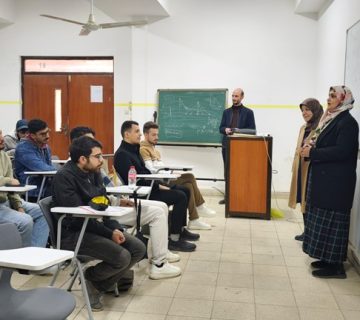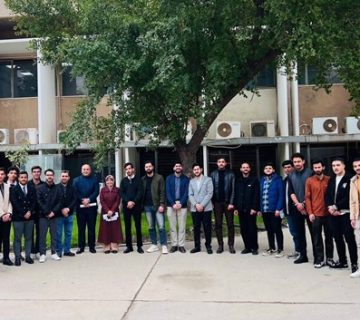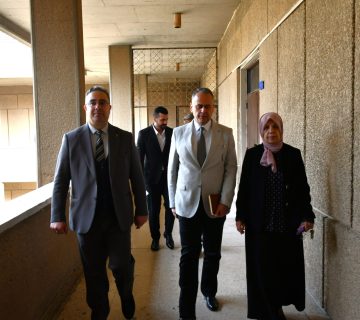It was conducted on Tuesday, 14/11/2023, in Dr. Munther Al-Droubi hall the discussion of the PhD Dissertation of the student Ihsan Zaidan Salim, which is tagged:
” Thermal Performance Enhancement of Multi-stage Flash Desalination System Using Thermal Compressor via Wasted Energy”.
The discussion committee consisted of names listed below:
1 Prof. Dr. Akram W. Ezzat (Chairman).
2- Prof. Dr. Muna S. Kassim (Member).
3- Prof. Dr. Ammar Ali Farhan (Member).
4- Asst. Prof. Dr. Jasim M. Mahdi (Member).
5- Asst. Prof. Dr. Basima I. Waisi (Member).
6- – Prof. Dr. Najim A. Jassim (Supervisor).
The current study included a focus on the three most reliable heat sources that can be exploited from oil and gas processing in oil fields due to their abundance. The proposed system consists of a water-cooled condenser, an evaporator and a jet flash evaporation or vacuum pump to produce the required pressure in the evaporator. The methodology and techniques used in this research consist of two parts. Part one is experimental work, which includes an integrated system that will be designed, including a water tank, heat exchangers, steam generator, injection system, pumps, valves and flow pipes. Also, measuring and control instruments will be used at each point of the system. The second is modelling technology, which will use many software programs in this work such as (FLUENT), to design and evaluate the functioning of the main parts of the seawater desalination system, (HYSYS) software has been used to model the seawater desalination process.
The Dissertation included recommendations including:
- The total energy wasted in the process of one cubic meter of crude oil inside the oil fields, the amount of energy resulting from burning associated gas to produce one barrel of oil, is equivalent to (91,650 MJ).
- Water desalination performance is affected by several factors, The most important are the operating conditions for each part of the seawater desalination system, and the supporting equipment used.
- The best thermal performance coefficient obtained is in a system consisting of three evaporation and condensation phases. The best thermal performance coefficient was (5.2) without using the steam ejector and (8.5) with the use of the steam ejector.
- The energy consumed in producing (1 m3) of pure water is only the pump energy, and compared to the membrane-type desalination system, the percentage of energy required is approximately (9.9%). In other words, exploiting associated gas in the seawater desalination process will save (90%) of energy.
After the scientific discussion by the members of the discussion committee, the researcher received a rating of (very good).








